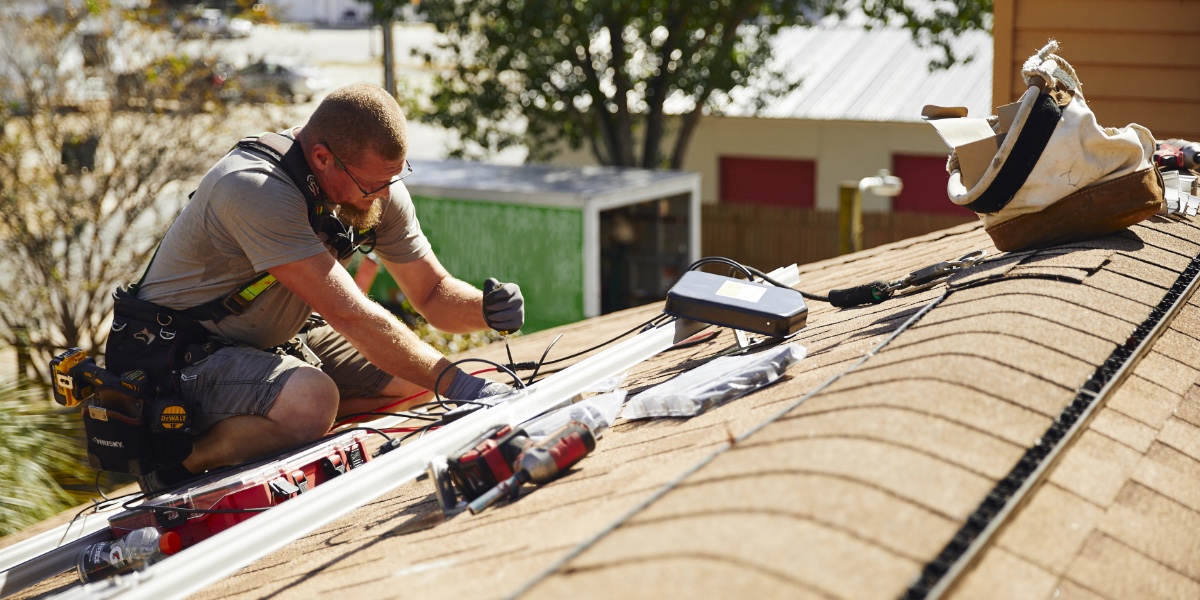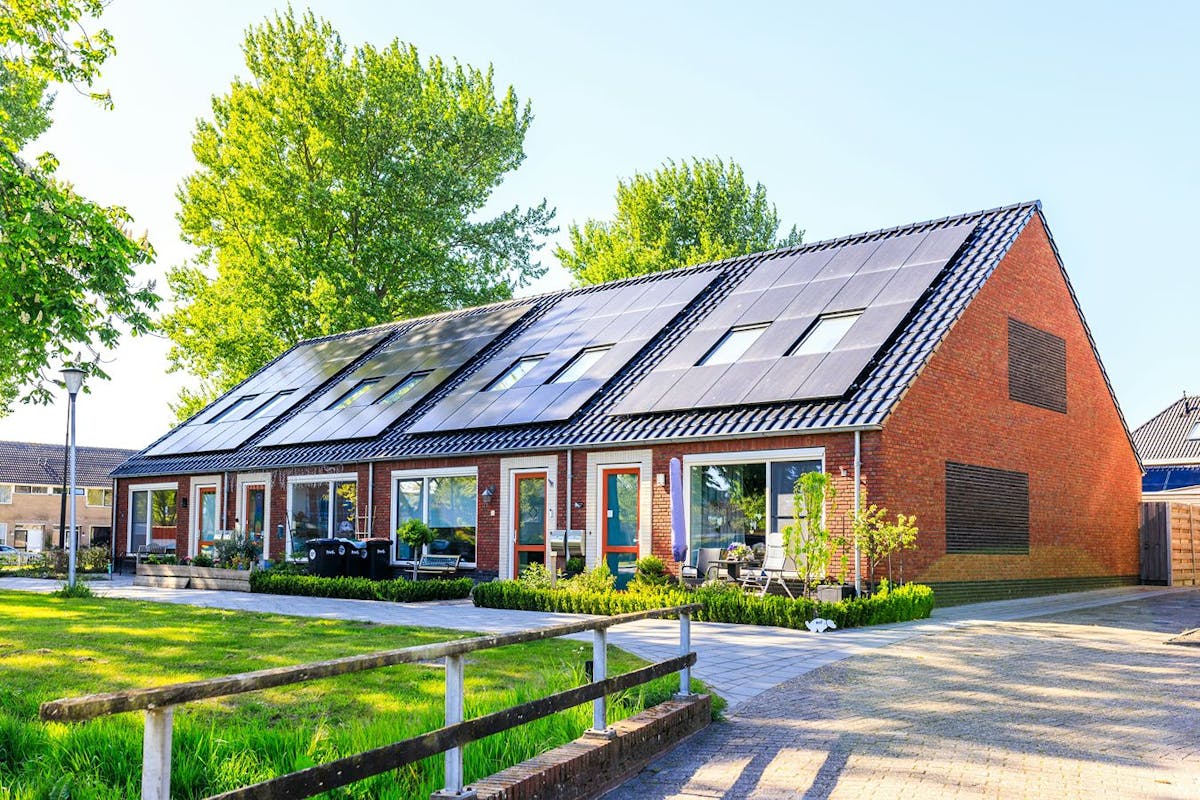What Happens if Your Solar Company Goes Out of Business?
Last edited

Author
Andrew Blok
Electrification and Solar Writer and Editor

Editor
Ryan Barnett
SVP, Policy & New Market Development

Home solar panels can last two or three decades, or even longer. This means the panels could well outlast the companies that make or install them. If the solar company that you worked with to buy and install your home solar panels goes out of business, what are your options?
When you still need answers, maintenance, or service, finding a company you can trust is important. Here’s what you can do when your original solar company goes out of business, and you need help with your solar panels.
See how much you can save by going solar with Palmetto
What happens if your solar company goes out of business?
What happens when your solar company goes out of business depends on your installer. Here is how each situation might affect you.
Large, national-scale installers
When a large solar installation company shuts down or goes out of business, another company in the clean energy space usually comes in, acquires the remaining assets, and takes over solar support for the existing customers.
For example, when Sungevity declared bankruptcy in 2017, Sunrun acquired all of the existing solar lease agreements, so Sunrun became the service provider for Sungevity customers, ensuring their continued solar service.
Small, local installers
Depending on the size of the company, when a local solar installer goes out of business, sometimes larger clean energy companies will come in and acquire the existing customers. In this case, the acquirer assumes responsibility for all services promised to the customer, and you get a new provider to maintain and service your solar power equipment like your original installer would have.
However, not all small-scale solar companies find a willing buyer, and even if your original company gets purchased, you might not like working with the new company. In this case, you can look for a solar operation and maintenance (O&M) plan that offers long-term solar maintenance and support. Or, you can find a company to hire as issues arise.
If your solar company goes out of business, your O&M provider will continue to service and repair your solar energy system, just like your original installer would have, so you shouldn’t need to worry about getting solar support when needed.
If your solar installer goes out of business, you may still have a warranty that covers potential issues with your equipment. Solar warranty work can be tricky to manage, but an O&M provider can negotiate with the solar equipment manufacturer on your behalf, saving you a headache and, maybe, a bit of money.
See how much you can save by going solar with Palmetto
My solar power system isn't working. What are my options?
There are a few things you can do yourself to fix minor problems with your solar energy system. For instance, you can remove debris or branches that may be preventing the panels from receiving maximum sunlight. Gently rinsing your panels from the ground can remove dust if it hasn’t rained for a while. You can also confirm the inverter LED light is on (usually green) or switch on any circuit breaker switches that may have tripped.
If your solar power system isn’t working and your solar company goes out of business, it’s best to contact a solar service professional for any repairs.
An experienced solar service company will perform a comprehensive diagnosis that can help quickly pinpoint any faults in your installation. Once the issue has been diagnosed, technicians find the right parts to ensure your equipment gets fixed.
What happens to my solar lease if the company goes out of business?
If you’re leasing solar panels, you may have some protection if your solar company goes out of business, especially if your lease includes a production guarantee. Since the lease company owns the equipment, not you, if the system isn’t generating power for any reason, the lease company is incentivized to get that system working properly as soon as possible.
If your original solar lease company goes out of business, it’s very likely your lease contract will be acquired by another company that will become your main provider of service and support.
What kind of service and maintenance do solar panels need?
Regular service and maintenance can keep your solar energy system operating safely and efficiently. Optimum performance lets you enjoy maximum savings on your energy bills, and a well-maintained system can last for decades.
The following are some service and maintenance tasks a solar service specialist might perform:
- Cleaning the panels and ensuring they are free of debris
- Inspecting parts for corrosion, deterioration, and defects
- Removing debris from vents
- Confirming all electrical components are functioning properly
- Ensuring fittings and cables are secure
- Clearing access to isolator switches
- Reviewing inverter data for any recorded faults
Pro Tip: Keep all the paperwork from your original solar installer, since the product warranty might cover some issues. You’ll need to know who manufactured the equipment, when it was purchased, and other details your paperwork should contain. In addition, many warranties require you to keep your solar equipment in good working order, so a service plan like Palmetto Protect is an easy way to show you’ve stayed current with maintenance and support needs.
See what solar can do for you:
What if I want to upgrade my solar power system?
If your solar company goes out of business, it’s still possible to upgrade your solar equipment or add more solar panels. If you bought an electric car for the first time or have a growing family, your original system size might not cover your needs. It’s valuable to find a company experienced with a wide range of solar equipment since they’ll know what equipment can work together.
Why do solar companies go out of business?
The solar industry has grown steadily for years, so why do solar companies go out of business? There are a few different reasons.
Poor customer service
Some solar companies are more interested in installing solar equipment for new customers than supporting existing customers.
A business that can’t provide solutions to customer complaints isn’t going to have a good reputation, and those unhappy customers spread the word about their unfortunate experiences, making it hard for that company to get new business.
Low-quality equipment
Cheap solar equipment can be more affordable but is more likely to develop problems over time. This can result in customers making multiple requests for service, repairs, and replacements, which can strain the company's resources. If an installer isn’t able to service equipment that fails, they might be forced to go out of business.
Legal action
One reason for lawsuits against solar companies is misleading sales pitches or consumer law violations. The Federal Trade Commission levies hefty fines on these dishonest businesses. Fines or a court ruling may put a company out of business.
'Fly-by-night' solar companies
Government incentives like the solar tax credit and a steady reduction in solar energy system prices have resulted in a strong demand for solar power. As a result, many fly-by-night solar companies popped up.
These companies were often experienced in other parts of the construction industry but didn’t have solar expertise.
Some inexperienced companies had challenges installing and maintaining their systems, while others offered warranties they couldn't honor.
Eventually, these companies either closed down or moved on to the next construction market, leaving consumers with no clear options for solar maintenance and support.
See how much you can save by going solar with Palmetto
History of solar companies going out of business
Between 2000 and 2016, about 8,700 unique solar companies installed at least one solar energy system in American homes. By the end of 2016, only 2,900 installers were still active, meaning two-thirds of all solar companies had disappeared.
Most of the companies that closed were smaller solar businesses that only serviced a few homes, but even some solar heavyweights, like the examples below, are no longer in business. The list of bankrupt solar companies is filled with companies of all shapes and sizes.
2020 was an especially tough year for solar companies, as the COVID-19 pandemic placed restrictions on how companies could do marketing and how they could install solar power systems.
Real Goods Solar: As a pioneer in the US solar industry, installing rooftop solar panels as early as 1978, Real Goods Solar raised more than $50 million from investors when it went public in 2008. Unfortunately, they struggled to make the business profitable and tried to pivot to selling Dow’s Powerhouse solar shingles in 2019, before finally declaring bankruptcy in January 2020.
Sungevity: At one time the fourth-largest US rooftop solar company in terms of market share, Sungevity was founded in 2007, and had raised $70 million in investor equity by 2014. In 2017, following a Chapter 11 bankruptcy filing and private equity acquisition, they created two separate companies, Solar Spectrum and Horizon Solar Power, under the Sungevity umbrella. Unfortunately, that plan didn’t work, and they laid off 400 employees in March 2020, before ceasing operations in November 2020.
EnergyONE: Started in 2013, EnergyONE had several divisions, installing commercial, residential, and rural PV solar energy systems in Kansas, Missouri, Iowa, Nebraska, and Oklahoma. As business slowed, it consolidated over a two-year period, before eventually merging with KC Energy Solar in October 2020 to become EnergyONE Renewables.
NRG Home Solar: NRG is one of America's largest power providers. NRG Home Solar was its attempt at entering the solar market, including the acquisition of the portable solar power company Goal Zero. At one point in 2015, NRG Home Solar was the fourth-largest residential solar installer in the country, but that same year, their solar division lost $175 million. In 2016, they tried to restructure, pulling out of California, Connecticut, and North Carolina to focus on Massachusetts, New Jersey, and New York, but still couldn’t make the solar business work. Eventually NRG ended its NRG Home Solar installation business, and focused instead on generating solar leads through their retail business to pass along to third parties.
Petersen-Dean: Founded by Jim Petersen in 1984, Petersen-Dean was once one of the nation’s largest independently-owned solar and roofing companies, with nearly 3,000 solar and roofing employees in nine states: Arizona, California, Colorado, Florida, Hawaii, Louisiana, Nevada, Oklahoma, and Texas. COVID-19 hit Petersen-Dean especially hard. Their solar leads dropped 87% from March to May 2020. Facing mounting debts, they filed for Chapter 11 bankruptcy protection in June 2020.
Empire Solar Group: Empire Solar Group was worth more than $150M at its peak. Financial obligations built up, and Suntuity Solar stepped in to collaborate with Empire. Suntuity provided millions of dollars in financial support and brought on Rock Creek Advisors to guide a restructuring, but even after extensive cost-cutting measures, Empire was unable to continue. In August 2021, Empire Solar went out of business and filed for Chapter 7 bankruptcy protection, with former employees bringing a class-action lawsuit against the company's founders.
Sullivan Solar Power: Founded by Daniel Sullivan in 2004, Sullivan Solar was focused on the San Diego area. Sullivan’s most well-known installation was a 336,520-watt solar power system for the San Diego Padres at Petco Park, the largest solar installation on any stadium in Major League Baseball. In November 2021, Sullivan Solar Power went out of business.
Pink Energy: Formerly known as PowerHome Solar, Pink Energy, founded by Jayson Waller, shut down at the end of 2022 and filed for bankruptcy shortly after. News reports of dishonest sales tactics and faulty systems preceded Pink Energy’s closure and nine states have stepped in to seek relief for its customers.
ADT Solar: ADT bought Sunpro Solar in 2021 to form its solar business, ADT Solar. In January 2024, ADT Solar closed up shop, stopping installs after large losses in 2023. The company cited “macroeconomic headwinds” for its exit. Notably, interest rates were high and the residential solar market in California slowed down in the second half of 2023 following the move to NEM 3.0.
Vision Solar: After its sales tactics came under scrutiny, Vision Solar declared bankruptcy at the end of 2023. The company was being sued by Connecticut and other states when it went out of business.
Titan Solar Power: Founded in Arizona, Titan Solar was one of the largest residential solar installers when it closed its doors in 2024. In June, an email sent to Titan employees said the company couldn’t be sold and it was shutting down. It was also facing lawsuits over its sales tactics.
SunPower: Once one of the largest solar companies in the country, SunPower filed for bankruptcy protection in August 2024 after halting many installations the month before. SunPower also agreed to sell assets to Complete Solaria. If you have a lease with SunPower, it may be part of that package.
Just because solar companies sometimes go out of business doesn’t mean solar can’t be a good fit. If you’re curious about the potential of solar panels at your home, try Palmetto’s solar savings tool. If saving money on your utility bills sounds good, with solar power or not, check out the Palmetto app. With a free account on the app, you can track your energy usage, see ways to save, and look at smart and energy-saving devices in the app shop.
If you’ve already gone solar and need service on a system installed by a company that no longer exists, contact Palmetto to see if we offer service in your area.
See what solar can do for you:
Frequently asked questions
Can I get service for solar panels installed by a company that is out of business?
Some solar companies will service solar panels they didn’t install. In some cases, you may be able to buy a monitoring and service plan from a third-party solar company.
How many solar companies have gone out of business?
It’s hard to say, since the solar industry has been around since the 1970s. In periods of high growth or high volatility, there may be more bankruptcies than normal.



